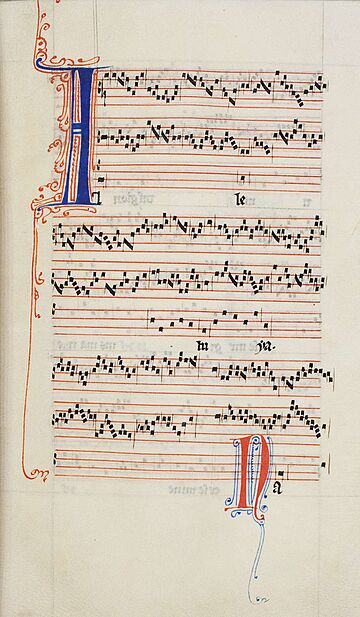Ars antiqua facts for kids

Ars antiqua (pronounced "Ars an-TEE-kwa") is a Latin term meaning "old art" or "old style." It is used by experts today to describe Medieval music from Europe. This music was popular during the High Middle Ages, roughly between the years 1170 and 1310.
This period includes the music from the famous Notre-Dame school in Paris. It also saw the early growth of the motet, which is a type of song for a choir. The term Ars antiqua usually refers to sacred music (church music) that used polyphony. Polyphony means having multiple, independent melodies playing at the same time. It does not usually include non-religious songs sung by troubadours and trouvères, which often had only one melody.
The term Ars antiqua is often used in contrast to ars nova, which means "new art" or "new style." The change from Ars antiqua to Ars nova was not sudden. Instead, it was a slow shift that happened between the 13th and 14th centuries.
History of Old Music Styles
Most of the composers from the Ars antiqua period are unknown today. However, two important composers from the Notre Dame school are known by name: Léonin (who lived in the late 1100s) and Pérotin (who lived around 1180 to 1220). Later, Petrus de Cruce, who wrote motets, was another composer whose name we remember.
During the Ars antiqua period, there were big improvements in how music was written down. Especially important were the changes in how rhythm was shown. Before this time, music notation showed the notes to sing, but not how fast or slow they should be.
A famous music expert from the early 1200s was Johannes de Garlandia. He wrote a book that explained "rhythmic modes." These were specific patterns of long and short notes that musicians could follow.
Later, a German expert named Franco of Cologne made another huge step forward. Around 1280, he created a system where different shapes of notes had different rhythmic values. This meant that a musician could look at a note and know exactly how long to hold it. This idea changed European music forever!
Even though the Ars antiqua style became less popular in the early 1300s, some people still loved it. One defender was Jacques of Liège (also known as Jacob of Liège). Around 1320, he wrote a strong criticism of the "new" Ars nova style. He thought Ars antiqua was "modest music" and Ars nova was "indulgent music." He felt the new style was too fancy and not serious enough.
See also
- Renaissance of the 12th century
- Polyphonic Era
- Medieval music
 | Ernest Everett Just |
 | Mary Jackson |
 | Emmett Chappelle |
 | Marie Maynard Daly |

